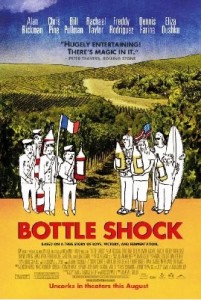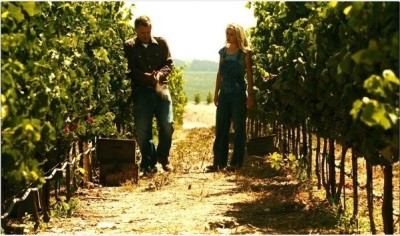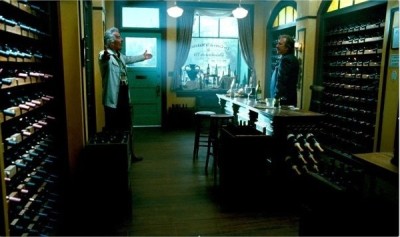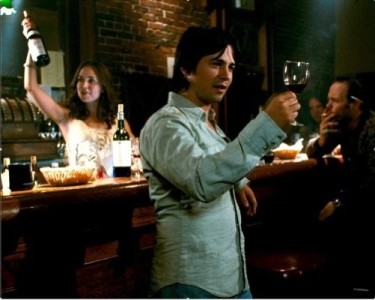By: debbie lynn elias
 A glass of wine is much like a film. There are nuanced notes to both compositions that synergistically meld and melt into one another creating a full-bodied bouquet that tantalizes the senses, lingering long after the glass is empty or the last frame has rolled on the screen. Sometimes the results are delicious, provocative, entertaining, enjoyable, even educational, while other times, each can leave a souring taste that spoils your experience for years to come. With BOTTLE SHOCK, both the film and the story and wines on which it is based are full-bodied pleasurable experiences with the perfect high notes, entertaining even the most discerning palettes.
A glass of wine is much like a film. There are nuanced notes to both compositions that synergistically meld and melt into one another creating a full-bodied bouquet that tantalizes the senses, lingering long after the glass is empty or the last frame has rolled on the screen. Sometimes the results are delicious, provocative, entertaining, enjoyable, even educational, while other times, each can leave a souring taste that spoils your experience for years to come. With BOTTLE SHOCK, both the film and the story and wines on which it is based are full-bodied pleasurable experiences with the perfect high notes, entertaining even the most discerning palettes.
The time is 1976. America is celebrating her bicentennial in all her glory. A time when American pride is at an all time high. A time when the American spirit of “can do” and success means something. A time when America and in this case, California, is about to declare yet another victory on the world.
Jim Barrett is a salt of the earth kind of guy. A former lawyer, he gave up a successful partnership in a law firm to fulfill his dream of owning a winery, harvesting grapes and developing the perfect Chardonnay. With his 18 year old son Bo by his side, following his divorce from Bo’s mother, Barrett purchased the Chateau Montelena Vineyard and set out on his own American Dream. Sadly, the going is quite tough, particularly in 1976, a time when it was a well known fact that the only “good” wines or “fine” wines came from France. As far as the world was concerned, California didn’t have the climate, the soil, the panache, or the taste buds to create a good wine. But, tell that to Jim Barrett and other vintners in the Napa and Sonoma Valleys. As we quickly learn, however, Barrett may have the desire and dream to make the perfect wine, but he clearly doesn’t have the business acumen to see it through. With money gone and Bo appearing as no more than a hippie slacker at odds with his hard-working down to earth dad (who take out their frustrations by boxing each other) , Jim sees the handwriting on the wall as the bank turns him down for yet another loan.
Meanwhile, across the pond (aka the Atlantic Ocean), renowned British wine connoisseur Steven Spurrier is attempting to revive his failing wine shop in France. More pompous and arrogant than allowed by any standard but for the fact that Spurrier attributes it to “being British”, on the encouragement of his American friend and businessman Maurice, Spurrier concocts the idea to hold a contest – a blind wine tasting contest – pitting the well known and accepted fine wines of France against the unknown, and undoubtedly inferior wines from California now trying to make an appearance on the wine scene, against each other.
Viewed more as a publicity stunt than actual contest, Spurrier makes his way to Napa where he meets Jim Barrett, a man whose own pride and stubbornness rivals that of Spurrier. Talk about a head butting competition! Bo, however, is not as proud or stoic as his father and, with his affable, free spirited demeanor, exposes Spurrier to not only the Napa community and fine American cuisine (like KFC and guacamole) but the wines of Napa. It doesn’t take long for Spurrier to realize he may actually have a real competition on his hands as – surprise, surprise, surprise – the Napa wines are GOOD! Nay, Napa wines are great!
Soliciting 2 bottles each from selected vintners from which he make his ultimate selections for the taste testing, Spurrier makes his way back to France for the competition, but not before Bo defies his father’s orders and as Spurrier is about to board his plane hands him 2 bottles of Chateau Montelena’s finest Chardonnay – a wine that is so perfect that it turns color from lack of oxygen (but thankfully, back again) leading an unknowing Jim Barrett to believe the wine is bad and Chateau Montelena and the Barrett family is ruined.
With all the formality and pomp associated with the French and the British Spurrier, the most well known vinophiles in Europe judge the competition. And as we all know, to the shock and horror of most of the French judges, Chateau Montelena Chardonnay 1973 comes out the winner. And what’s this? 4 out of the 5 prize winning reds are also California wines! The world of wine will never be the same again.
This is the most full-bodied, texturally nuanced and tonal cast to come along in many an ensemble film. Alan Rickman is impeccable haughty refinement as Steven Spurrier. Believing himself to be “so million miles away from the right casting to play him.”, in his preparation for the role, beyond the obvious (imbibing of wine), he attributes his formative French lessons, “Because I’m playing that kind of upperclass Englishman, it’s a matter of honor to speak French with a terrible accent. No concessions will be made at all” and his telephone conversations with Spurrier. Written with Rickman in mind, as have other characters he has portrayed in the past, I asked him if he felt it burdensome or pressuring playing Spurrier. On the contrary for as he knows in cases like this, “ They are going to let you breathe. That is luxury.”
The first person that comes to my mind as Jim Barrett is Bill Pullman. Luckily for us, Pullman was the pick here, particularly in light of the casting of Chris Pine as Barrett’s son, Bo. Get these two in a room and not only do the laughs abound, but the father-son chemistry is undeniably loving and supportive. Pullman gives one of his finest performances (notwithstanding his upcoming “Your Name Here”) as he portrays the somewhat harried dreamer with an infectious passion. The first time I met Chris Pine, he was just out of high school and it has been a joy to watch him through the years. As Bo, despite a really bad wig, he completely captures the 70’s mindset and attitude with joyous aplomb.
Rounding out the ensemble are Freddy Rodriguez, Rachel Taylor, Dennis Farina, Miguel Sandoval and Eliza Dushka. Rodriguez, as fellow vintner/Barrett employee/best friend of Bo, Gustavo Brambila, acts like a glue that brings the Barretts, Spurrier and the community together. He provides one of the most heartfelt and stirring monologues. Exploding onto the scene in “Transformers”, here as Sam Clayton, Taylor provides the female element and potential love interest for both Gustavo and Bo. She is luminous, intelligent and witty bringing an ethereal element to the already mystical beauty of Napa and pivotal to the ultimate outcome of the competition. Dennis Farina’s character as Spurrier’s friend Maurice was created just for the film, but I can’t imagine Spurrier didn’t have a friend like him. Energetic, over the top and downright fun, this is the kind of friend we all want. Another piece of fiction is Eliza Dushku’s, Joe, the local bar owner. Again, pivotal to expedite the story, she is luminous and strong-willed and a delight.
Written by Randall Miller and Jody Savin and directed by Miller, this project originally started out in the hands of writer Ross Schwartz, son of the legendary Sherwood Schwartz, but after languishing for several years, breathed life for the first time thanks to Miller and Savin. Spending a great deal of time with the Barretts, their cooperation and input was not only essential to filming (yes, it is actually Chateau Montelena in the film), but in filling in pieces of the story and character development. Although certain elements of the story were fictionalized, such as the characters of Maurice and Joe, other aspects, such as the boxing Barretts is not far from the truth, with the only deviation being made literal rather than figurative interpretation, and making the daisy chain of events come together in a neat little package. As Pullman says many things, like the “boxing thing, felt really organic to me and maybe it will stick out for somebody else.” That in a nutshell, is the true gift of Miller and Savin, their writing, their visual acumen, their characterizations “stick out” and are relatable to you and me. As for his direction, Miller excels at eliciting the perfect emotion, perfect inflection, perfect performance from his actors, which could explain why Rickman, Pullman and Dushku, having worked with him previously were so desirous to come on board.
Despite a very tight budget, production values are extremely high, particularly with long time Miller-Savin collaborators, Director of Photography Michael Ozier (whose work is worth the price of admission), Editor Dan O’Brien (who keeps a leisurely pacing befitting a Sunday afternoon in the park sipping a bottle of wine) and Production Designer Craig Sterns in tow. Effervescing like a freshly opened bottle of champagne is a soundtrack and score that will catapult you back to 1976. I know it did me.
Everyone was in agreement on the joy of filming in Napa. Besides the beauty of it all, which caused producers to come up with an increased budget when Wilson insisted on some aerial shots of the area so spectacular no one could deny his request, Napa just fed the imagination of each as they embodied their roles, right down to learning how to hold grapes, cut leaves, hold a knife, tap a vat.
According to Rickman, the end of the movie (which goes beyond the actual competition)is largely based on his conversation with Spurrier “because I didn’t know that he restaged the competition in 2006. And he said to me on the phone, I was sure this time that the French wines were going to win. And it would rescue my reputation amongst the French.” Does it? Watch and see.
Interestingly, as eluded to by Rickman, Savin and Miller, in a real post script, just two days before my interviews with the cast and crew, a French winery (the vintner of which who was portrayed in the film as poo-pooing California wines) bought Chateau Montelena.
So kick back and relax and take a sip of BOTTLE SHOCK. It will linger on your palette long after the curtain falls.
Steven Spurrier: Alan Rickman Jim Barrett: Bill Pullman Bo Barrett: Chris Pine
Directed by Randall Miller. Written by Miller and Jody Saving based on a screenplay by Ross Schwartz. (110 min)












